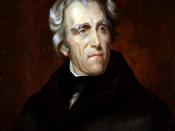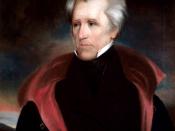In the 1820's and 1830's, the Jacksonian Democrats, with Andrew Jackson as their leader, viewed themselves as the guardians of the Constitution, political democracy, individual liberty, and equality of economic opportunity. However, this view did not truly represent the actions taken by President Andrew Jackson and his followers, it was only a façade put up to mask their sectionalist ideas.
One of the disparities in the views and actions of the Jacksonian Democrats involved social equality. Jackson repeatedly held sectionalist views and did things that were better for the average, poor community than for the country as a whole. One such example of this is shown in Documents B and C involving the National Bank. In his National Bank veto message in Document B, Jackson says, "It is to be regretted that the rich and powerful too often bend the acts of government to their selfish purposes." Jackson singles out the wealthier class and accuses them of being selfish.
Because this ridiculous comment has no intelligent purpose other than to create an enormous, nationwide class clash, it must be seen as evidence that Jackson was a sectionalist. Daniel Webster responded to this message in Document C by stating, "It manifestly seeks to inflame the poor against the rich ⦠for the purpose of turning against them [the other class] the prejudices and the resentments of the other classes." Daniel Webster is saying what was previously mentioned. It was as though Jackson was trying to anger the poor to turn against the rich. Jackson's actions show that his primary goal was not to help the country, but to address his own personal issues. This completely contrasts the Jacksonian Democrats view of themselves. The Jacksonians thought that they were acting in the best interest of the country, where they were truly...


